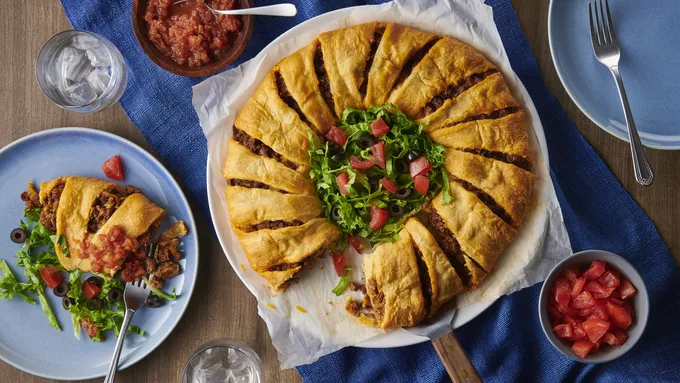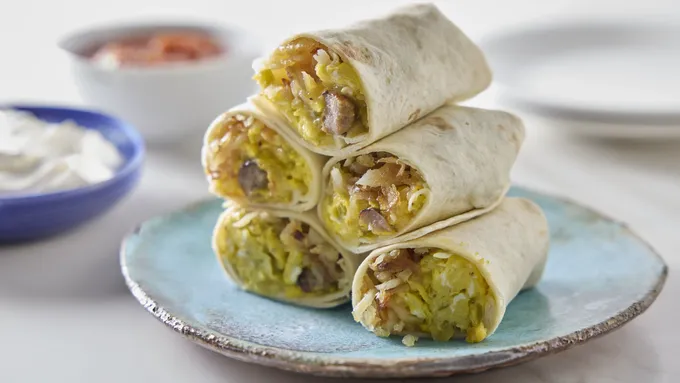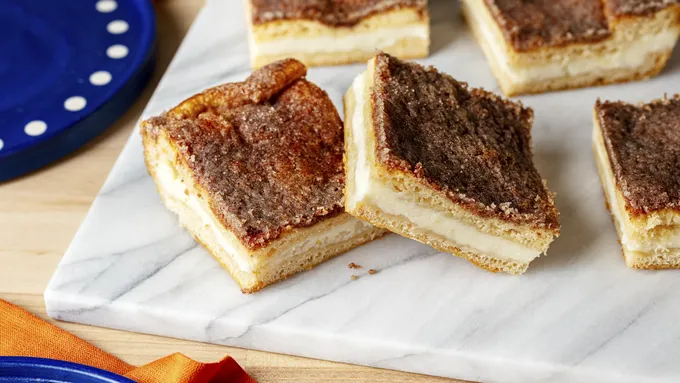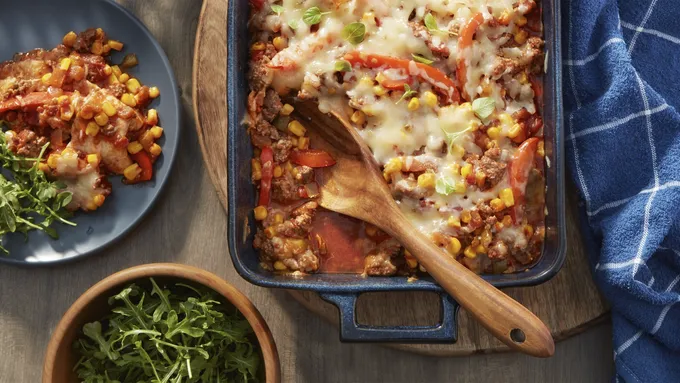How to Make Fajitas
These steps along with the complete recipe will show you how to make fajitas at home. So you can serve this delicious dish and get all the oohs and ahhs that usually go to the waiters:
Prepare the Oven and Seasoning Mix
For your steak and veggies to broil properly, arrange a rack 4 inches from your broiler unit before you turn on the oven. Mix the chili powder, cumin, salt, and garlic powder. This delicious blend will cleverly season both the steak and the veggies.
Season the Veggies and Steak
Mix the pepper strips and onion slices with a little vegetable oil and some of the seasoning mix until they are evenly coated. Arrange them in a single layer (for even cooking), leaving some room for the steak. Mix the remaining seasoning mix and more oil to create a rub for the steak. Massage it into both sides of the beef, working the flavors into the meat. Place the steak on the pan with the veggies.
Broil the Steak and Veggies
The veggies need to be turned over once with a long-handled tongs and pancake turner to get them to cook evenly. These tools will keep your hands from getting burned. The steak doesn’t need to be turned but should be broiled until an instant-read meat thermometer reaches the desired temperature. Use the lower temperature if you like your steak medium-rare, or the higher temperature if you like your steak with less pink. It will continue to cook as it sits before slicing.
Cutting and Serving the Fajitas
For tender slices, this cut of steak needs to be cut in a certain way. The long ridges that run through the steak is known as the “grain.” To cut across the grain, rotate the steak if necessary so the grain is running parallel to the edge of your work surface. This way, when you make cuts, it will be against the grain, which is desirable to cut through the fibrous texture of this steak. Holding the knife at a 45-degree angle, cut the steak into thin slices. Serve the slices of steak with the veggies and tortillas.
Fajita Ingredients
See what each of these fajita ingredients adds to this dish to make a top-rated recipe:
Seasonings: Chili powder lends an earthy, aromatic, and somewhat spicy flavor to the steak fajita seasoning. Cumin brings a smokiness while salt and garlic powder balance and enhance the taste of the peppers, onions, and steak. You could substitute a packet of fajita seasoning mix or taco seasoning mix for this seasoning combination, saving yourself time.
Veggies: Red onions have a tangy, sweet flavor that makes them delicious when broiled. Red and yellow bell peppers are both sweeter and milder in flavor than green bell peppers, but unlike chile peppers, these varieties don’t bring any heat.
Flank Steak: This cut of beef is very flavorful and tender when cooked with a dry cooking method, such as broiling. Slice the steak as directed (see our how to make fajitas section above for tips just how to do it), for the most delicious pieces you can get.
Tortillas: Flour tortillas are included in this recipe. Lay strips of the steak and some of the cooked veggies inside a tortilla and dive in!
The Best Fajita Toppings
The great thing about this steak fajita recipe is you can keep the fajitas plain (they are loaded with flavor on their own) or dress them to the nines, if you are a topping lover. Mix and match any of these fajita toppings below:
Sauces: Guacamole, sour cream, or salsa (red or green) are tasty options to put out for everyone to drizzle on their fajitas, if they choose.
Rice or Beans: Refried beans or heated black refried beans make a great topper that help to hold the fillings inside the tortilla. Or serve with cooked white or brown rice to bulk up the fajitas even more.
Clever Condiments: Roasted corn salad, a squeeze of fresh lime juice, or a sprinkling of chopped fresh cilantro leaves up the fajita game to new heights.
Storing and Reheating Fajitas
While you’ll have amazing flavor and texture when fajitas are served right after they are cooked, leftover fajitas can be delicious when reheated for another meal.
Refrigerator Storage
Store the meat and veggies in separate food-storage containers. Cover and refrigerate them up to 3 days.
Freezer Storage
Freezer storage isn’t recommended for this recipe. It can make the beef tough and dry, and the vegetables will get mushy when frozen and thawed.
Reheating Directions:
Place a serving of meat and some of the veggies in separate small microwavable bowls. To reheat the meat, cover and microwave on Medium (50%) 30 seconds to 1 minute; just until heated through. Avoid overcooking, as the meat can get tough. Then cover the bowl with the veggies loosely. Microwave on Medium-High (70%) about 1 minute or until heated through. Spoon both the steak and veggies into tortillas and top as you like.
More Fajita Recipes
If you love the flavor of fajitas like we do, try one of these recipe twists from our list of our favorites:
Easy Fajita Soup: All the flavors of fajitas in a quick-to-fix, hearty, slurpable soup.
Oven Fajitas: When prepared this way, chicken fajitas couldn’t be easier. Only 5 minutes to get this easy dinner into the oven.
Fajita Pasta Bake: All the flavors of fajitas are mixed with chicken breast and pasta to create a luscious, hearty Mexican-inspired casserole.
Chicken Fajita Bubble-Up Bake: A quick-and-easy chicken fajita casserole topped with taco-dusted biscuits and melty cheese.
Frequently Asked Questions
Do I Need a Skillet to Make Fajitas?
Traditional fajita recipes are made in a cast-iron skillet on the stove or a grill. But if you want to get to enjoying fajitas faster, this recipe broils everything on one sheet pan in the oven. It replicates some of the flavor that comes with charred veggie edges you get from a cast-iron skillet, but with a lot less time and effort.
Should I Slice the Steak Before or After Cooking It?
Always cook flank steak whole and slice it after cooking. Not only does the meat stay much moister, but it’s also a lot easier to slice when cooked to tender perfection. See our how to make fajitas section above for tips on how to slice the meat into thin, tender slices.
(function() {
document.addEventListener('DOMContentLoaded', function() {
var componentMetadata = JSON.parse('\x7b\x22componentName\x22\x3a\x22RecipeFAQ_e8af84a8-5198-47ca-bc1c-daf22247ecf7\x22,\x22deferOptions\x22\x3a\x7b\x22deferComponent\x22\x3afalse,\x22deferType\x22\x3a\x22None\x22,\x22deferId\x22\x3a\x22r6c2bd91fe82c40ab8c4c9d8eb0fa64df\x22,\x22deferredContainerId\x22\x3a\x22\x2fmain\x2frdpFAQ\x22,\x22deferredContainerView\x22\x3anull\x7d,\x22viewName\x22\x3a\x22RecipeFAQ\x22\x7d');
var configuration = {"title":"Sheet Pan Fajitas","introduction":"\u003cp\u003eSteak fajitas may have gotten their Spanish nickname back in the 1930s from the ranch lands of Texas and Mexico. During cattle roundups, cows were frequently butchered to feed the ranch hands. Cuts of beef that were usually discarded, included meat trimmings such as skirt steak, were given to the Mexican vaqueros (cowboys) as part of their pay.\u003c/p\u003e\u003cp\u003eSkirt steak is one of the most flavorful cuts of beef, but it’s also one of the toughest. It comes from the diaphragm muscle; it’s long, thin, and like a belt. The word “fajita” comes from the Spanish word meaning “belt” or “sash.” When properly sliced and cooked the flavorful strips of this steak are absolutely delicious.\u003c/p\u003e\u003cp\u003eFajitas started gaining in popularity after being served on sizzling platters to tables in Texas restaurants. As the popularity of the dish grew, the less likely it was made with skirt steak, as there are a limited number of skirt steaks per cow. Other cuts of meat and other ingredients such as chicken, shrimp, or even vegetables started to be used to make “fajitas,” even though the name of the dish isn’t really applicable if skirt steak isn’t used.\u003c/p\u003e\u003cp\u003eOur fajita recipe slashes time out of the recipe. There is no standing over a hot stove or cooking in a cast-iron pan or grill. We broil both the meat and the veggies at the same time in the oven, so this quick version doesn’t have to be brought out only for special occasions. It’s fast enough for any weeknight meal! You can enjoy fajitas practically year around, as the dish is light enough for spring evenings yet hearty enough for a fall or winter supper. Give it a try and let us know how you like it.\u003c/p\u003e","servingSize":"1 Serving","image":{"small":{"media":"(min-width: 0px)","src":"https://mojo.generalmills.com/api/public/content/kVmhign59EuJxkZPq04XbQ_webp_base.webp?v=23d8bec3\u0026t=e724eca7b3c24a8aaa6e089ed9e611fd"},"medium":{"media":"(min-width: 500px)","src":"https://mojo.generalmills.com/api/public/content/kVmhign59EuJxkZPq04XbQ_webp_base.webp?v=23d8bec3\u0026t=191ddcab8d1c415fa10fa00a14351227"},"large":{"media":"(min-width: 767px)","src":"https://mojo.generalmills.com/api/public/content/kVmhign59EuJxkZPq04XbQ_webp_base.webp?v=23d8bec3\u0026t=191ddcab8d1c415fa10fa00a14351227"},"alt":"Sheet Pan Fajitas"},"contributor":{"label":"By","name":"Pillsbury Kitchens","profileUrl":"/about-us","displayDate":{"label":"Updated","date":"Jan 1, 2025"}},"ingredientGroups":[{"ingredients":[{"quantity":"2","description":"tablespoons chili powder"},{"quantity":"2","description":"teaspoons ground cumin"},{"quantity":"2","description":"teaspoons salt"},{"quantity":"1/2","description":"teaspoon garlic powder"},{"quantity":"1","description":"medium red onion, halved and cut into 1/4-inch slices"},{"quantity":"2","description":"medium red or yellow bell peppers, cut into 1/4-inch strips"},{"quantity":"1/4","description":"cup vegetable oil"},{"quantity":"1 1/3","description":"lb beef flank steak"},{"quantity":"6","description":"tortillas from 1 package (8.2 oz) Old El Paso™ Flour Tortillas for Soft Tacos and Fajitas (10 Count)"}]},{"name":"Make it FRESH toppings, as desired","ingredients":[{"quantity":"","description":"Lime wedges"},{"quantity":"","description":"Sour cream"},{"quantity":"","description":"Salsa"},{"quantity":"","description":"Guacamole"},{"quantity":"","description":"Chopped fresh cilantro"}]}],"steps":[{"description":"Position oven rack 4 inches from broiler. Spray 18x13x1-inch pan with cooking spray. In small bowl, mix chili powder, cumin, salt and garlic powder.","stepShotImageUrl":"//mojo.generalmills.com/api/public/content/QRpcsAukek-h-k8_U3vXsA_webp_base.webp?v=8fe99a7c\u0026t=51a43a57af4046789e5a7f20567b1195"},{"description":"In large bowl, toss onion, bell peppers, 2 tablespoons of the vegetable oil and 1 tablespoon of the seasoning mixture; mix until evenly coated. Transfer vegetable mixture to pan in single layer, allowing room for steak. In same bowl, add remaining 2 tablespoons oil and remaining seasoning mixture. Add steak; rub mixture into steak. Transfer steak to pan with vegetables.","stepShotImageUrl":"//mojo.generalmills.com/api/public/content/1QkaFZN0IUGiTNbNaQSdvA_webp_base.webp?v=2b5193a8\u0026t=51a43a57af4046789e5a7f20567b1195"},{"description":"Broil 9 to 11 minutes, stirring vegetables once, until instant-read thermometer inserted in thickest part of steak reads 145°F to 160°F (medium-rare to medium). Transfer steak to cutting board; cover with foil. Let stand 5 minutes. Stir vegetables, and return to oven 2 to 6 minutes or until vegetables are blackened in spots."},{"description":"Thinly slice steak on the bias, against the grain. Serve with vegetables in tortillas with remaining ingredients.","stepShotImageUrl":"//mojo.generalmills.com/api/public/content/hL69sES0FUWMqiC788iesQ_webp_base.webp?v=95d93013\u0026t=51a43a57af4046789e5a7f20567b1195"}],"tips":[{"title":"","description":"This easy fajitas recipe broils seasoned flank steak, roasted peppers, and onions all on one sheet pan, for a delicious and flavorful no-fuss dinner.","category":"Rich Snippet","tipShots":[]},{"title":"","description":"Feel free to use your favorite bell pepper, and add color by choosing a variety like yellow, red and orange.","category":"Recipe/Ingredient Facts","tipShots":[]},{"title":"","description":"You may notice some watering out on sheet pan after baking, which is normal. Simply pour off the liquid before serving.","category":"Serving Suggestions/Menu","tipShots":[]},{"title":"","description":"Kitchen Tested - 5/2017.","category":"Kitchen Tested","tipShots":[]}],"kitchenTips":[{"title":"","description":"Feel free to use your favorite bell pepper, and add color by choosing a variety like yellow, red and orange.","category":"Recipe/Ingredient Facts","tipShots":[]},{"title":"","description":"You may notice some watering out on sheet pan after baking, which is normal. Simply pour off the liquid before serving.","category":"Serving Suggestions/Menu","tipShots":[]}],"additionalContent":[{"title":"How to Make Fajitas","description":"\u003cp\u003eThese steps along with the complete recipe will show you how to make fajitas at home. \u0026nbsp;So you can serve this delicious dish and get all the oohs and ahhs that usually go to the waiters:\u003c/p\u003e\u003ch3\u003e\u003cstrong\u003ePrepare the Oven and Seasoning Mix\u003c/strong\u003e\u003c/h3\u003e\u003cp\u003eFor your steak and veggies to broil properly, arrange a rack 4 inches from your broiler unit before you turn on the oven. Mix the chili powder, cumin, salt, and garlic powder. This delicious blend will cleverly season both the steak and the veggies.\u003c/p\u003e\u003ch3\u003e\u003cstrong\u003eSeason the Veggies and Steak\u003c/strong\u003e\u003c/h3\u003e\u003cp\u003eMix the pepper strips and onion slices with a little vegetable oil and some of the seasoning mix until they are evenly coated. Arrange them in a single layer (for even cooking), leaving some room for the steak. Mix the remaining seasoning mix and more oil to create a rub for the steak. Massage it into both sides of the beef, working the flavors into the meat. Place the steak on the pan with the veggies.\u003c/p\u003e\u003ch3\u003e\u003cstrong\u003eBroil the Steak and Veggies\u003c/strong\u003e\u003c/h3\u003e\u003cp\u003eThe veggies need to be turned over once with a long-handled tongs and pancake turner to get them to cook evenly. These tools will keep your hands from getting burned. The steak doesn’t need to be turned but should be broiled until an instant-read meat thermometer reaches the desired temperature. Use the lower temperature if you like your steak medium-rare, or the higher temperature if you like your steak with less pink. It will continue to cook as it sits before slicing.\u003c/p\u003e\u003ch3\u003e\u003cstrong\u003eCutting and Serving the Fajitas\u003c/strong\u003e\u003c/h3\u003e\u003cp\u003eFor tender slices, this cut of steak needs to be cut in a certain way. The long ridges that run through the steak is known as the “grain.” To cut across the grain, rotate the steak if necessary so the grain is running parallel to the edge of your work surface. This way, when you make cuts, it will be against the grain, which is desirable to cut through the fibrous texture of this steak. Holding the knife at a 45-degree angle, cut the steak into thin slices. Serve the slices of steak with the veggies and tortillas.\u003c/p\u003e","category":"SEO Content_1","tipShots":[]},{"title":"Fajita Ingredients","description":"\u003cp\u003eSee what each of these fajita ingredients adds to this dish to make a top-rated recipe:\u003c/p\u003e\u003cp\u003e\u003cstrong\u003eSeasonings: \u003c/strong\u003eChili powder lends an earthy, aromatic, and somewhat spicy flavor to the steak fajita seasoning. Cumin brings a smokiness while salt and garlic powder balance and enhance the taste of the peppers, onions, and steak. You could substitute a packet of \u003ca href=\u0022https://www.oldelpaso.com/products/fajita-seasoning-mix-1-oz\u0022\u003efajita seasoning mix\u003c/a\u003e or \u003ca href=\u0022https://www.oldelpaso.com/products/taco-seasoning-mix-original-1-oz-packet\u0022\u003etaco seasoning mix\u003c/a\u003e for this seasoning combination, saving yourself time.\u003c/p\u003e\u003cp\u003e\u003cstrong\u003eVeggies:\u003c/strong\u003e Red onions have a tangy, sweet flavor that makes them delicious when broiled. Red and yellow bell peppers are both sweeter and milder in flavor than green bell peppers, but unlike chile peppers, these varieties don’t bring any heat.\u003c/p\u003e\u003cp\u003e\u003cstrong\u003eFlank Steak:\u003c/strong\u003e This cut of beef is very flavorful and tender when cooked with a dry cooking method, such as broiling. Slice the steak as directed (see our how to make fajitas section above for tips just how to do it), for the most delicious pieces you can get.\u003c/p\u003e\u003cp\u003e\u003cstrong\u003eTortillas:\u003c/strong\u003e Flour tortillas are included in this recipe. Lay strips of the steak and some of the cooked veggies inside a tortilla and dive in!\u003c/p\u003e","category":"SEO Content_2","tipShots":[]},{"title":"The Best Fajita Toppings","description":"\u003cp\u003eThe great thing about this steak fajita recipe is you can keep the fajitas plain (they are loaded with flavor on their own) or dress them to the nines, if you are a topping lover. Mix and match any of these fajita toppings below:\u003c/p\u003e\u003cp\u003e\u003cstrong\u003eSauces:\u003c/strong\u003e \u003ca href=\u0022https://www.pillsbury.com/recipes/10-minute-fresh-guacamole/80316448-8295-467e-b0e3-4fd1d1baf7a9\u0022\u003eGuacamole\u003c/a\u003e, sour cream, or salsa (red or green) are tasty options to put out for everyone to drizzle on their fajitas, if they choose. \u0026nbsp;\u003c/p\u003e\u003cp\u003e\u003cstrong\u003eRice or Beans:\u003c/strong\u003e \u003ca href=\u0022https://www.oldelpaso.com/products/refried-beans-traditional-31-oz-can\u0022\u003eRefried beans\u003c/a\u003e or heated black refried beans make a great topper that help to hold the fillings inside the tortilla. Or serve with cooked white or brown rice to bulk up the fajitas even more.\u003c/p\u003e\u003cp\u003e\u003cstrong\u003eClever Condiments:\u003c/strong\u003e \u003ca href=\u0022https://www.pillsbury.com/recipes/roasted-corn-and-pepper-salad/6148a846-ad49-452b-ba15-744d6cfdbbea\u0022\u003eRoasted corn salad\u003c/a\u003e, a squeeze of fresh lime juice, or a sprinkling of chopped fresh cilantro leaves up the fajita game to new heights.\u003c/p\u003e","category":"SEO Content_3","tipShots":[]},{"title":"Storing and Reheating Fajitas","description":"\u003cp\u003eWhile you’ll have amazing flavor and texture when fajitas are served right after they are cooked, leftover fajitas can be delicious when reheated for another meal.\u003c/p\u003e\u003cp\u003e\u003cstrong\u003eRefrigerator Storage\u003c/strong\u003e\u003c/p\u003e\u003cp\u003eStore the meat and veggies in separate food-storage containers. Cover and refrigerate them up to 3 days.\u003c/p\u003e\u003cp\u003e\u003cstrong\u003eFreezer Storage\u003c/strong\u003e\u003c/p\u003e\u003cp\u003eFreezer storage isn’t recommended for this recipe. It can make the beef tough and dry, and the vegetables will get mushy when frozen and thawed.\u003c/p\u003e\u003cp\u003e\u003cstrong\u003eReheating Directions\u003c/strong\u003e:\u003c/p\u003e\u003cp\u003ePlace a serving of meat and some of the veggies in separate small microwavable bowls. To reheat the meat, cover and microwave on Medium (50%) 30 seconds to 1 minute; just until heated through. Avoid overcooking, as the meat can get tough. Then cover the bowl with the veggies loosely. Microwave on Medium-High (70%) about 1 minute or until heated through. Spoon both the steak and veggies into tortillas and top as you like.\u003c/p\u003e","category":"SEO Content_4","tipShots":[]},{"title":"More Fajita Recipes","description":"\u003cp\u003eIf you love the flavor of fajitas like we do, try one of these recipe twists from our list of our favorites:\u003c/p\u003e\u003cp\u003e\u003ca href=\u0022https://www.pillsbury.com/recipes/easy-fajita-soup/ccaaae92-8a28-4309-91fb-db5f14552b7e\u0022\u003e\u003cstrong\u003eEasy Fajita Soup\u003c/strong\u003e\u003c/a\u003e\u003cstrong\u003e:\u003c/strong\u003e All the flavors of fajitas in a quick-to-fix, hearty, slurpable soup.\u003c/p\u003e\u003cp\u003e\u003ca href=\u0022https://www.pillsbury.com/recipes/easy-oven-fajitas/89c01655-4776-4261-9f86-555e97a49633\u0022\u003e\u003cstrong\u003eOven Fajitas\u003c/strong\u003e\u003c/a\u003e\u003cstrong\u003e:\u003c/strong\u003e When prepared this way, chicken fajitas couldn’t be easier. Only 5 minutes to get this easy dinner into the oven.\u003c/p\u003e\u003cp\u003e\u003ca href=\u0022https://www.pillsbury.com/recipes/easy-fajita-pasta-bake/e030fa32-e857-48dc-bf54-533e668c2c6d\u0022\u003e\u003cstrong\u003eFajita Pasta Bake\u003c/strong\u003e\u003c/a\u003e\u003cstrong\u003e:\u003c/strong\u003e All the flavors of fajitas are mixed with chicken breast and pasta to create a luscious, hearty Mexican-inspired casserole.\u003c/p\u003e\u003cp\u003e\u003ca href=\u0022https://www.pillsbury.com/recipes/easy-fajita-pasta-bake/e030fa32-e857-48dc-bf54-533e668c2c6d\u0022\u003e\u003cstrong\u003eChicken Fajita Bubble-Up Bake\u003c/strong\u003e\u003c/a\u003e\u003cstrong\u003e:\u003c/strong\u003e A quick-and-easy chicken fajita casserole topped with taco-dusted biscuits and melty cheese.\u003c/p\u003e","category":"SEO Content_5","tipShots":[]}],"faq":[{"title":"Do I Need a Skillet to Make Fajitas?","description":"\u003cp\u003eTraditional fajita recipes are made in a cast-iron skillet on the stove or a grill. But if you want to get to enjoying fajitas faster, this recipe broils everything on one sheet pan in the oven. It replicates some of the flavor that comes with charred veggie edges you get from a cast-iron skillet, but with a lot less time and effort.\u003c/p\u003e","category":"FAQ_1","tipShots":[]},{"title":"Should I Slice the Steak Before or After Cooking It?","description":"\u003cp\u003eAlways cook flank steak whole and slice it after cooking. Not only does the meat stay much moister, but it’s also a lot easier to slice when cooked to tender perfection. See our\u003cstrong\u003e \u003c/strong\u003ehow to make fajitas section above for tips on how to slice the meat into thin, tender slices.\u003c/p\u003e","category":"FAQ_2","tipShots":[]}],"tipCategories":[{"categoryName":"Kitchen Tested","heading":"More About This Recipe","cssClass":"recipePartStory","expandOnInit":false,"expandText":"More +","collapseText":"Less -","expandEventName":"","collapseEventName":"","image":"","tips":[{"title":"","description":"Kitchen Tested - 5/2017.","category":"Kitchen Tested","tipShots":[]}],"isExpandable":false},{"categoryName":"Rich Snippet","heading":"","cssClass":"recipePartMethodNote","expandOnInit":false,"expandText":"More +","collapseText":"Less -","expandEventName":"","collapseEventName":"","image":"","tips":[{"title":"","description":"This easy fajitas recipe broils seasoned flank steak, roasted peppers, and onions all on one sheet pan, for a delicious and flavorful no-fuss dinner.","category":"Rich Snippet","tipShots":[]}],"isExpandable":false}],"nutritionInfo":{"configuration":{"showAsTable":false,"noNutritionInformationAvailableMessage":"No nutrition information available for this recipe","poweredByText":"\u003cp\u003eNutrition information for this recipe is estimated using a leading nutrition calculation application, but is an estimate only. Actual nutrition values will vary based on the exact ingredients or brands you may use.\u003c/p\u003e\n\u003ca href=\u0022http://developer.edamam.com\u0022\u003ePowered By \u003cimg src=\u0022-/media/C4F33FD467AB4A3AB59AAC4F6306AB04.ashx\u0022 alt=\u0022Edamam\u0022 /\u003e\u003c/a\u003e","nutritionChartTitle":"Nutrition Facts","nutritionInformationLabel":"Nutrition","servingSizeText":"Serving Size:","dailyValuesDisclaimer":"*Percent Daily Values are based on a 2,000 calorie diet.","percentDailyValueText":"% Daily Value","percentDailyValueFooterTitleText":"% Daily Value*:","exchangeInformationTitleText":"Exchanges:","nutritionFactsExpandText":"More Nutrition","nutritionFactsCollapseText":"Less Nutrition"},"facts":{"carbohydrateChoice":{"amountPercent":"","amountUnits":"1","title":"Carbohydrate Choice"},"vitaminA":{"amountPercent":"20%","amountUnits":"20%","title":"Vitamin A"},"vitaminC":{"amountPercent":"30%","amountUnits":"30%","title":"Vitamin C"},"calcium":{"amountPercent":"4%","amountUnits":"4%","title":"Calcium"},"iron":{"amountPercent":"20%","amountUnits":"20%","title":"Iron"},"protein":{"amountPercent":"","amountUnits":"27g","title":"Protein"},"dietaryFiber":{"amountPercent":"9%","amountUnits":"2g","title":"Dietary Fiber"},"sugars":{"amountPercent":"","amountUnits":"2g","title":"Sugars"},"totalCarbohydrate":{"amountPercent":"6%","amountUnits":"17g","title":"Total Carbohydrate"},"sodium":{"amountPercent":"45%","amountUnits":"1080mg","title":"Sodium"},"potassium":{"amountPercent":"14%","amountUnits":"480mg","title":"Potassium"},"cholesterol":{"amountPercent":"21%","amountUnits":"65mg","title":"Cholesterol"},"transFat":{"amountPercent":"","amountUnits":"0g","title":"Trans Fat"},"saturatedFat":{"amountPercent":"19%","amountUnits":"4g","title":"Saturated Fat"},"totalFat":{"amountPercent":"24%","amountUnits":"16g","title":"Total Fat"},"caloriesFromFat":{"amountPercent":"","amountUnits":"140","title":"Calories from Fat"},"calories":{"amountPercent":"","amountUnits":"320","title":"Calories"}},"servingSize":"1 Serving","exchangeInfo":"1 Starch; 0 Fruit; 0 Other Carbohydrate; 0 Skim Milk; 0 Low-Fat Milk; 0 Milk; 1 Vegetable; 0 Very Lean Meat; 3 Lean Meat; 0 High-Fat Meat; 1 1/2 Fat;","showPoweredBy":false,"showRecipeTotalTime":true,"showRecipePrepTime":true,"showCarbohydrateChoices":true},"trademarks":[],"labels":{"ingredientsHeader":"Ingredients","stepsHeader":"Instructions","stepsImageHideText":"Hide Images","stepsImageShowText":"Show Images","stepNumberText":"Step","faqHeader":"Frequently Asked Questions","tipsHeader":"\u003cp class=\u0022textFirst\u0022\u003eRecipe Tips\u003c/p\u003e","tipItemHeadingFormat":"tip {0}","postedBy":"By","copyright":"© {yyyy} ®/TM General Mills All Rights Reserved","showDrawerText":"Show","hideDrawerText":"Hide","expandDescriptionText":"More +","collapseDescriptionText":"Less -","ariaLiveLabelFormat":"Showing {0} through {1} of {2}","scrollLeftButtonLabel":"Scroll Left","scrollRightButtonLabel":"Scroll Right","includeScrollIndicator":false},"primaryAttributes":[{"label":"Prep Time","values":[{"text":"30","label":"min"}]},{"label":"Total","values":[{"text":"30","label":"min"}]},{"label":"Ingredients","values":[{"text":"14"}]},{"label":"Servings","values":[{"text":"6"}]}],"secondaryAttributes":[],"badges":[{"badgeType":3,"badgeText":"","label":"Kitchen Tested","imageUrl":"/-/media/GMI/Core-Sites/PB/Images/Shared/RecipeParts/KitchenTested_PB1_new.jpg?sc_lang=en","linkUrl":"/about-us/kitchen-tested","metaDataTags":[],"showMemberInfo":false,"matchedMetadataId":"00000000-0000-0000-0000-000000000000"}],"backgroundImageUrl":"","breadcrumbs":{"links":[{"url":"/","label":"Home"},{"url":"/recipes","label":"Recipes"},{"url":"/recipes/dish-type/fajitas","label":"Fajitas Recipes"}],"currentPageName":"Sheet Pan Fajitas"}};
var moduleName = 'recipeFaq';
var isVueModule = true;
GeneralMills.PandoSites.RegisterControlInstance(moduleName, configuration, componentMetadata, isVueModule)
});
})();
![]()
![]()
![]()










